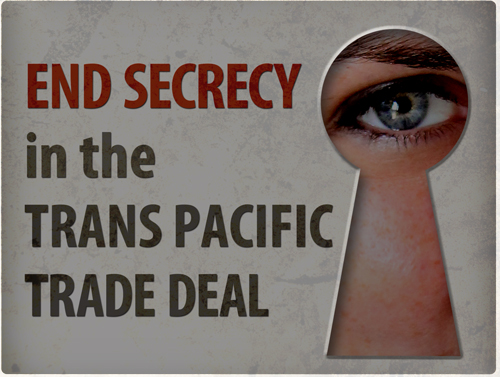
Enforceable environmental standards must be included in Trans Pacific trade agreement
Dateline Dallas: I arrived Tuesday, May 8, in this north Texas city for ten days of intense activity around a new regional trade pact called the Trans Pacific Partnership. During this week and a half, we have scheduled formal and informal meetings with negotiators, public teach-ins, civil society meetings and a major demonstration. Currently, Singapore, Malaysia, Chile, New Zealand, Brunei, Australia, Peru, Vietnam and the United States are participating in talks, but Japan, Canada, Mexico, the Philippines and other regional economic powers are now seeking or may soon seek to join. The U.S. negotiating team, backed up by scores of corporate lobbyists, is pushing hard to seal the TPP deal, which has the potential to not only be most expansive trade agreement the U.S has ever entered, but also one of the most socially unfair and one of the most dangerous for the environment.
What we are fighting for
One overarching civil society demand relates the way the TPP negotiations are conducted: most of the negotiating materials are kept secret from the public, but not from the official corporate advisors who are pushing hard for a “NAFTA of the Pacific.” While the majority of Americans are barred from knowing what’s taking place in negotiations, approximately 600 corporate representatives have been named “cleared advisors,” giving them regular access. This secrecy prevents a meaningful public debate about the consequences of the TPP agreement. Friends of the Earth is demanding the immediate release of the negotiating text.
On the environmental front, Friends of the Earth is telling negotiators that the TPP must include, among other key reforms, an environment chapter that does more than pay lip service to countries’ obligations to enforce domestic environmental protections and abide by multilateral environmental agreements. This means that the TPP environment chapter must be enforceable not merely through diplomatic consultations, but also through lawsuits before international tribunals with the authority to authorize sanctions.
Such a demand is well within the range of possibility. To the credit of the Obama administration, the Korea Free Trade Agreement, the most recent U.S. trade pact to come into force, does provide the means for effective enforcement. Chapter 20 of the Korea FTA, on environment, calls on both parties to enforce environmental laws at the national level and to observe listed multilateral environmental agreements. And, provision is made for state-to-state dispute resolution to enforce these obligations. The TPP environment chapter must take the same approach.
That’s not to say the Korea FTA is perfect on this matter; strictly state and local environmental regulations are exempt from chapter 20 coverage under the U.S.-Korea FTA, significantly limiting its efficacy. Many environmental regulations dealing with water or wildlife conservation, for example, involve state and local governments in the U.S. and “sub-national” governments in other countries. They were not covered under chapter 20 of the Korea FTA, even though water policy issues, for example, are frequent topics of international trade or investment litigation. Negotiators in Dallas need to close this loophole as they take up the TPP environment chapter.
All of that said, even if this loophole is closed and enforceable standards are adopted, there is no guarantee that the parties will spend the political capital necessary to effectively enforce their own laws, obey obligations under multilateral environmental agreements, or invoke state-to-state dispute mechanisms to enforce other parties’ compliance. So, environmental groups must remain vigilant and prepared to mobilize politically to hold governments accountable.
While in Dallas, other priority demands include:
- Drop the investment chapter from the agreement, or at least exclude authorization for investor-state dispute resolution. Investor-state resolution mechanisms allow business-friendly tribunals to assess massive money damages against governments to compensate corporations for the cost of complying with environmental and climate policies, as well as other public interest measures;
- Exclude intellectual property protections for patents on plants and animals. Also, exclude any other provisions that facilitate trade and commerce in genetically engineered plants and animals, and include provisions that preserve the authority of governments to enforce strict precautionary regulations and labeling requirements for products produced using genetic manipulation techniques — notably synthetic biology; and
- Exclude the regulatory coherence chapter, proposed by the United States that could promote the use of business-friendly, cost-benefit analysis to hamstring environmental or other public interest regulations.
These four TPP issues related to the chapters on environment, investment, intellectual property and regulatory coherence are not the only provisions of concern to environmentalists. Effective environmental and public health policies also could be compromised by chapters relating to trade in goods, services and government procurement, among others. The U.S. model for the Trans Pacific trade deal needs top to bottom reform. Friends of the Earth is demanding a fair deal for the environment or no deal at all.
Related Posts
Ways to Support Our Work

Read Latest News
Stay informed and inspired. Read our latest press releases to see how we’re making a difference for the planet.

See Our Impact
See the real wins your support made possible. Read about the campaign wins we’ve fought for and won together.

Donate Today
Help power change. It takes support from environmental champions like you to build a more healthy and just world.